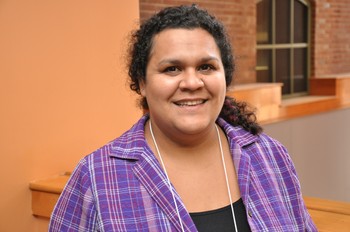Twelve international peacemakers from around the world are visiting congregations, presbyteries and colleges of the Presbyterian Church (U.S.A.) Sept. 19-Oct. 12.
They are sharing their stories about church-based ministries in their countries that seek peace justice and pursue peace in the name of Jesus Christ. This year’s international peacemakers come from Colombia, Egypt, Ethiopia, Jamaica, Madagascar, Malawi, Mexico, Palestine, the Philippines, Russia, South Sudan and Syria.
The International Peacemaker program is sponsored by the Presbyterian Peacemaking Program.
Rosario Jocabed (Joca) Gallegos Viesca serves as the Mexican Coordinator with Frontera de Cristo, a Presbyterian border ministry located in the sister cities of Agua Prieta, Sonora and Douglas, Arizona. She is well acquainted with issues of violence, poverty, trade, health care, and family life faced by these two cities along the US/Mexico border. Joca is a graduate of the Presbyterian Seminary in Mexico City and has served in the Presbytery of Chihuahua. She worked alongside her father in Hispanic Ministry in South Carolina for 3 years before returning to Mexico to develop her ministry. She is a 4th generation Presbyterian, something that is uncommon in northern Mexico. Joca currently lives in Agua Prieta.
What is the most important situation in your country that you will be addressing?
In the last two years, we have seen a lot of kids being targeted by the drug cartels. A lot of minors—even kids as young as 10 years old—have been getting into drugs. I’m going to talk about one of the girls that we have been working with, Estela, who is 15 years old and has been in recovery for two years. She started using drugs at the age of 10 and was also getting into prostitution at that time to get drugs. Frontera de Cristo is working in partnership with “Just Coffee” [a coffee grower cooperative] to build a coffee house where the clients of CRREDA [an NGO drug and alcohol rehabilitation center] can have dignified work, where we can talk with minors about the intervention and prevention of drugs, and where we can drink “just coffee,” but also spread the love of God in the midst of the situation.
How are the faith communities trying to address this situation?
One of the good things about Frontera de Cristo is that a lot of different faith communities are involved. Even though the Presbyterian Church of Mexico and the PC(USA) broke off relations [in 2011], we’re still working together. We say that the situation with the churches is like parents and the family. At some point, relations between the couple—the father and the mother—broke and they separated, but they have children. And we, as a Presbyterian Border Ministry, because we are part of the children, we have contact with the Presbyterian Church of Mexico, one of our parents, and the PC(USA), our other parent. We’re looking at the new ways that we have to develop as the children, involving people both inside and outside of the faith communities in the work that we do.
What peacemaking lessons from your situation are you trying to communicate to U.S. Presbyterians?
The coffee house that we’re building is one of the peacemaking examples that we have. We want people from the U.S. and other places to come and visit us and meet their “relatives.” One of the things that we want to do in the coffee house is give space to minors to hang out without an environment of drugs and alcohol. Every day we would like to do different things like have art or give them the space for an open microphone. We want people to see how we are being peacemakers in the community.
What is the primary message you want to communicate to U.S. Presbyterians about your country?
We as a program say that the most important thing isn’t sending us money, but having a relationship with those that you want to help. So come and visit us. In this way you’re going to see what we’re doing. Then if you decide to give or donate something, that’s perfect, but you need to see how we are serving as peacemakers before just giving us money. Relationships are very important for us.
Jocabed (Joca) Gallegos will be visiting the presbyteries of Western New York, East Tennessee, St. Augustine, and John Calvin.

